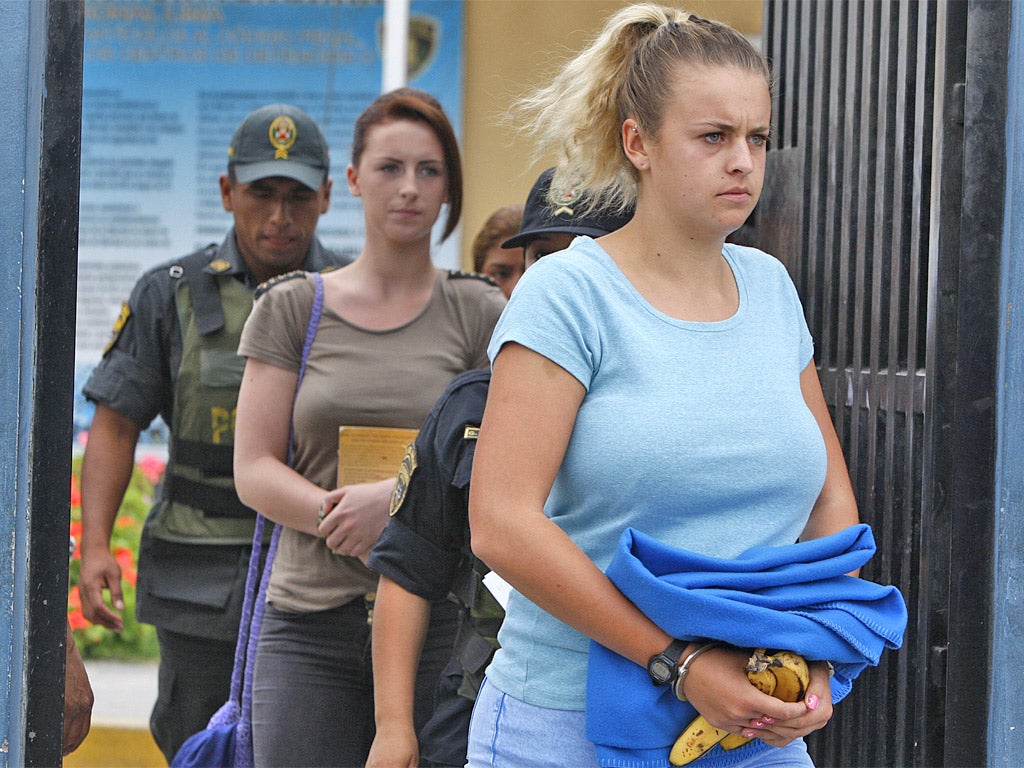Six years in a Peruvian jail for British women found with £1.5m of cocaine
Guilty pair Melissa Reid and Michaella McCollum could apply to serve their sentences here

Your support helps us to tell the story
From reproductive rights to climate change to Big Tech, The Independent is on the ground when the story is developing. Whether it's investigating the financials of Elon Musk's pro-Trump PAC or producing our latest documentary, 'The A Word', which shines a light on the American women fighting for reproductive rights, we know how important it is to parse out the facts from the messaging.
At such a critical moment in US history, we need reporters on the ground. Your donation allows us to keep sending journalists to speak to both sides of the story.
The Independent is trusted by Americans across the entire political spectrum. And unlike many other quality news outlets, we choose not to lock Americans out of our reporting and analysis with paywalls. We believe quality journalism should be available to everyone, paid for by those who can afford it.
Your support makes all the difference.Two British women caught smuggling £1.5m of cocaine out of Peru have each been sentenced to six years and eight months in jail after apparently cutting a last-minute plea deal in a Lima court.
Melissa Reid and Michaella McCollum, both 20, had faced maximum prison terms of 15 years. Despite acknowledging they knowingly attempted to board a plane with the drugs at Lima’s Jorge Chavez airport in August, they went into the sentencing hearing not knowing whether their admissions – made as part of the plea deal – would be fully accepted by prosecutors.
That was because of their initial claims they had been coerced at gunpoint by unnamed Colombian gangsters who, the pair told investigators, had kidnapped them in the Spanish party island of Ibiza where they were working during the summer.
Prosecutors rejected that story and pressed Reid, from Lenzie, near Glasgow, and McCollum, from Dungannon, County Tyrone, in Northern Ireland, to tell them who had provided them with the 24lbs of drugs found hidden in food packages in their luggage as they passed through security checks to catch a flight to Madrid.
But they have now been sentenced to eight years, the minimum under Peruvian law for drug traffickers. That was then automatically reduced by one sixth because they co-operated with investigators.
The time the pair have already spent in custody will count towards their sentence, meaning they should be freed in 2020. Because their sentence is less than seven years, they could apply to serve their jail terms in the UK, a move that would have to be approved by both the British and Peruvian governments.
The precise nature of the additional information provided by the pair to investigators remains unclear as the hearing was held in private because the courtroom, in Lima’s Sarita Colonia jail, was too small to hold the journalists covering the case.
However, Reid’s lawyer, Meyer Fishman, revealed news of their sentences shortly afterwards. Before the hearing, McCollum and Reid were seen handcuffed and looking pensive as they stepped off a police bus that had transported them across Lima from the Virgen de Fatima jail to the court.
McCollum wore a beige T-shirt, tight dark jeans and had her hair in a bun. She was clutching a book, published in 2009 by US self-help author Barbara De Angelis, called Secrets About Life Every Woman Should Know: Ten principles for spiritual and emotional fulfillment.
Reid had her hair in a ponytail and was wearing a sky-blue T-shirt and matching jeans. She had a blanket over her hands, an apparent attempt to hide her handcuffs from the public.
The pair are the latest victims of the cocaine trade – and, critics claim, the “war on drugs” declared by US President Richard Nixon 40 years ago – which has ruined hundreds of thousands of lives across Latin America.
Although Mexico’s staggering death toll, put at more than 60,000 during the 2006-2012 presidency of Felipe Calderon, is well documented, less attention has been directed on the “mules”, who transport much of the cocaine out of the Andean region.
According to one recent study, more than 70 per cent of all female prisoners in Latin America are being held on drugs charges, often, like the British pair, convicted of the high-risk, low-profit crime of smuggling narcotics across international borders, sometimes hiding them in their own bodies.
In Peru, about 90 per cent of the nearly 1,800 foreign prisoners, hailing from everywhere from Mexico to Australia, Africa and Eastern Europe, are being held on drugs charges.
According to United Nations statistics, Peru recently overtook Colombia as the world’s top producer of cocaine, crack and other coca-derived illegal substances. Bolivia remains a distant third.
Most Peruvian and Bolivian cocaine comes to Europe, while Colombia’s ends up in the US.